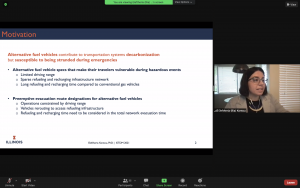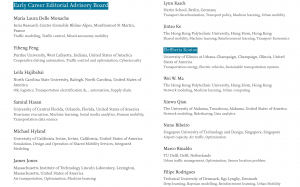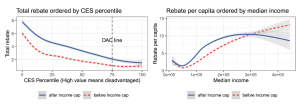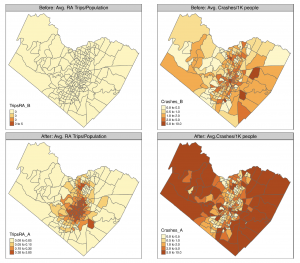 We presented our research with PhD student, Denissa Purba, and Prof. Chrysafis Vogiatzis this Thursday Jun 24, 2021 on alternative fuel vehicle evacuation planning during the 2021 ISTDM conference!
We presented our research with PhD student, Denissa Purba, and Prof. Chrysafis Vogiatzis this Thursday Jun 24, 2021 on alternative fuel vehicle evacuation planning during the 2021 ISTDM conference!
Tag: 2021
Kontou invited to be a member of the Transportation Research Part C journal Early Career Editorial Advisory Board!
 Dr. Kontou was invited as a member of the Early Career Editorial Advisory Board (EAB) of the Transportation Research Part C: Emerging Technologies journal! This board is equivalent to the conventional EAB, but a special title was given to promote and give opportunities to junior scientists (mainly junior Assistant Professors)! As of May 2021, TRC has a CiteScore of 12.2, an impact factor 6.077, a 5-year impact factor 7.080, and a SJR 3.342.
Dr. Kontou was invited as a member of the Early Career Editorial Advisory Board (EAB) of the Transportation Research Part C: Emerging Technologies journal! This board is equivalent to the conventional EAB, but a special title was given to promote and give opportunities to junior scientists (mainly junior Assistant Professors)! As of May 2021, TRC has a CiteScore of 12.2, an impact factor 6.077, a 5-year impact factor 7.080, and a SJR 3.342.
Kontou is invited to the 2021 US FOE Symposium!
Excited for the opportunity to participate in the 2021 US Frontier of Engineering Symposium organized by the National Academy of Engineering! Glad to be part of the 100 early career participants who were invited from industry, research, and academia. More info here: https://www.naefrontiers.org/197388/2021-US-Frontiers-of-Engineering-Symposium. The announcement posted in the CEE website can be found here.
Undergraduate researcher Balisi wins honorable mention during the 2021 Undergraduate Research Symposium!
Congrats, Simon Balisi!
Simon, mentored by PhD student Denissa Purba, received the Numbers and Computation section honorable mention during the 2021 Undergraduate Research Symposium for our poster “Charging Station Location Study to Support Electric Vehicle Evacuation Preparedness“!
More info here: https://blogs.illinois.edu/view/6204/2114603494.
Energy Policy paper on disparities in electric vehicle rebates allocation is published!

Our research examining equity issues of electric vehicle rebate allocation was published open access in Energy Policy. The paper was coauthored by Shuocheng Guo and Dr. Kontou; Shuocheng completed this research as part of an independent study under Ria’s advisement before completing his MS degree at UIUC! A brief overview and major findings of this research are presented below:
Overview: Incentives such as electric vehicle rebates assist with alleviating high capital costs of alternative fuel cars. We uncover distributional effects of plug-in electric vehicle rebates, focusing on a program in the State of California. We use economic attributes representative of populations of census tracts as well as data on rebates distributed to plug-in electric vehicle buyers through the Clean Vehicle Rebate Project from 2010 to 2018. Horizontal and vertical equity coefficients are computed, while measurement of spatial association characterizes spatial patterns of rebates allocation across the State. We evaluate the distributional fairness of rebates allocation between income groups and disadvantaged communities.
Major findings: We find that rebates have been predominantly given to high income electric vehicle buyers. However, the share of rebates distributed to low-income groups and disadvantaged communities increased over time and after an income-cap policy was put into effect. Spatial analysis shows high spatial clustering effects and rebates concentration in major metropolitan regions. We reveal neighborhood effects: communities with lower median income or disadvantaged receive higher rebate amounts when these are geographic neighbors to clusters characterized as high rebate amount receivers.
By assessing electric vehicles rebate allocation equity, we highlight potential criteria and directions for future policy design. Equitable incentive design could make a difference in the uptake of electric vehicles in disadvantaged and low-income communities!
Kontou wins Grainger Small Equipment Grant to establish a Transportation Systems Lab!
Dr. Kontou is the PI of a winning Grainger small equipment grant! She and her co-PIs (faculty of the transportation systems group) will use the funding to purchase equipment and software to elevate transportation systems research and education at UIUC, providing our students access to simulation and visualization software, raspberry-pi cameras and sensors, and a deep learning server! More info here.
Purba wins WTS Greater Chicago Scholarship!
 Denissa Purba, a first-year PhD student of the Kontou research group, won one of the WTS Greater Chicago Chapter Executive Partners Scholarship. Women’s Transportation Seminar (WTS) promotes, encourages, and supports women in the transportation profession. The announcement can be found here. Congratulations, Denissa!
Denissa Purba, a first-year PhD student of the Kontou research group, won one of the WTS Greater Chicago Chapter Executive Partners Scholarship. Women’s Transportation Seminar (WTS) promotes, encourages, and supports women in the transportation profession. The announcement can be found here. Congratulations, Denissa!
New publication on ridesourcing safety externalities

Dr. Kontou’s paper with Prof. Noreen McDonald from the Department of City and Regional Planning of the University of North Carolina at Chapel Hill is now accepted at PLOS ONE. Their paper answers the question “is ridesourcing related to road crashes, injuries, and DUI offenses?” providing insights from Travis county, Texas. They find that increases in ridesourcing trips (Uber and Lyft-like services) were not associated with worsening road safety. While studying the operations of RideAustin, Profs. Kontou and McDonald uncovered that for every 10% increase in ridesourcing trips, there was an expected 0.12% decrease in road crashes, a 0.25% decrease in road injuries, and a 0.36% decrease in driving while impaired offenses in Travis County. The magnitude of road safety improvement is smaller compared to the expected safety effectiveness of other interventions, such as seatbelt laws, reduced speeds, and traffic calming design. The paper can also be found in arxiv.
